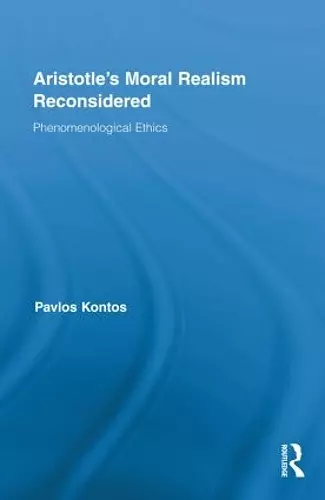Aristotle's Moral Realism Reconsidered
Phenomenological Ethics
Format:Hardback
Publisher:Taylor & Francis Ltd
Published:22nd Jun '11
Currently unavailable, and unfortunately no date known when it will be back
This hardback is available in another edition too:
- Paperback£54.99(9780415856744)

This book elaborates a moral realism of phenomenological inspiration by introducing the idea that moral experience, primordially, constitutes a perceptual grasp of actions and of their solid traces in the world. The main thesis is that, before any reference to values or to criteria about good and evil—that is, before any reference to specific ethical outlooks—one should explain the very materiality of what necessarily constitutes the ‘moral world’. These claims are substantiated by means of a text- centered interpretation of Aristotle’s Nicomachean Ethics in dialogue with contemporary moral realism. The book concludes with a critique of Heidegger’s, Gadamer’s and Arendt’s approaches to Aristotle’s ethics.
"The moral realism that this book defends may be contrasted with phenomenological accounts of moral experience found in Heidegger, Gadamer, and Arendt and with the view of analytic philosopher John McDowell. [...] This well-structured argument for a strong version of moral realism makes use of a comparable analysis of people's capacity to perceive a common physical world. Such a clearly delineated shift in perspective raises many questions and undoubtedly will rejuvenate current discussions of moral realism." – S. A. Mason, Concordia UniversityinChoice
"This daring and resourceful book draws on a deep familiarity with the analytic (McDowell) and phenomenological (Arendt, Gadamer, Heidegger) traditions and their common ancestors (Aristotle, Kant) to defend a novel type of moral realism that owes most to the Nicomachean Ethics, and to a provocative interpretation of the kind of practical or 'phronetic' perception introduced there. It marks the presence of a distinctive new Greek voice on the philosophical scene. Anyone interested in ancient or modern ethics will benefit from engaging with it." – C.D.C. Reeve, Delta Kappa Epsilon Distinguished Professor of Philosophy at the UNC at Chapel Hill, USA
"The strength of this book lies in its offering a novel Aristotelian ethical theory that is both accessible to, and yet critical of, the two main contemporary western philosophical traditions. The particularly novel aspect of the theory lies in its emphasis on the ontology of prakta."– Carlo DaVia, Fordham University, USA in International Philosophical Quarterly
"Aristotle's Moral Realism Reconsidered: Phenomenological Ethicsis an extremely ambitious work that combines detailed Aristotle and Kant exegesis with philosophical engagement across analytic and continental traditions. ... Kontos' engagement with the diverse range of topics covered in the book is truly admirable, and one cannot help but feel that he is onto something deep and important. In particular, his attempt to counteract the solipsistic slant of many contemporary ethical frameworks is extremely refreshing and insightful. ... [T]he book contains enough food for thought to keep even the most voracious philosophical appetite engaged and stimulated." – Joseph Karbowski, University of Notre Dame, USAin Notre Dame Philosophical Reviews
"What a fine book Kontos has written. It will surely be of use to a great many scholars working in many different areas. It is a book I admire a good deal, not only for its clarity and rigor, but also for its willingness to navigate disputes on both sides of the English Channel." – J. Jeremy Wisnewski, Hartwick College, USA in Philosophy in Review
"Kontos’ Ancient Greek perspective on the notion ofpraktonis original and enriching for the actual discussion of moral realism. Even for those who know Ancient Greek philosophy, Kontos’ perspective on action is uncommon, for one tends to emphasize the ephemeral character of actions […]. In Pavlos Kontos’ monograph, by contrast, it’s the visibility and solidity of actions –i.e., their capacity to leave behind them traces in the world- as well as their worldliness that come to the foreground."–Friederike Rese,University of Freiburg, Germany in Zeitschrift für Philosophische Forschung
"The knowledge of the sources displayed by the author, his explicit phenomenological orientation as well as the serious way in which he attempts to appropriate the point of view of the analytic tradition, render this text an important element in the increasingly wide debate between these two institutionalized traditions." – Antonio Caeiro,Universidade Nova de Lisboa,Portugal in Euphrosyne
"The argument set forth by Pavlos Kontos is rich in nuances and suggestions […]. The most remarkable features of his work are the penetrating analysis, the coherence of the argument, and a very broad philosophical culture. […]. Its effect on the reader is [both] smooth and exciting. The thesis outlined by the author merits to be taken into serious consideration and will, without any doubt…deepen the relevant debate." – Alejandro G. Vigo, University of Navarre, Spain in Revue Philosophique de Louvain
"In this book Kontos has managed to move, via close reading and reinterpretation, from a lesser-known element of Aristotle’s metaphysics through a significant integration of Kant’s and Aristotle’s ethics to a world where moral actions are real and where people perceive these real actions through the faculty of phronetic perception. It is a thought provoking synthesis of Aristotelian moral realism and a phenomenological position that differs from Heidegger’s, Gadamer’s, and Arendt’s, and should provoke strong discussion." – Stephan Millett, Curtin University, Australia in Review of Metaphysics
"I personally admired Kontos’ vigilance in his interpretations, the cautious and at the same time efficient way in which he develops his questions before he gives any answers, the originality of a lot of his claims, his straitforwardness in contesting certain commonly accepted—though not always well argumeneted—views and interpretations, and his subtle irony." – P. Thanassas, University of Thessaloniki, Greece, in Critica
"Pavlos Kontos has written a rich and important book on Aristotle's moral realism. The book is rich in as much as it brings to the discussion of this topic the author's extensive and precise knowledge not only of the works of Aristotle but also of the more recent authors he places in relation to Aristotle." - Kevin Flannery, Gregorian University, The Thomist
ISBN: 9780415896740
Dimensions: unknown
Weight: 550g
210 pages